The Intel Core i9-9900KS Review: The 5 GHz Consumer Special
by Dr. Ian Cutress on October 31, 2019 10:45 AM ESTCPU Performance: Encoding Tests
With the rise of streaming, vlogs, and video content as a whole, encoding and transcoding tests are becoming ever more important. Not only are more home users and gamers needing to convert video files into something more manageable, for streaming or archival purposes, but the servers that manage the output also manage around data and log files with compression and decompression. Our encoding tasks are focused around these important scenarios, with input from the community for the best implementation of real-world testing.
All of our benchmark results can also be found in our benchmark engine, Bench.
Handbrake 1.1.0: Streaming and Archival Video Transcoding
A popular open source tool, Handbrake is the anything-to-anything video conversion software that a number of people use as a reference point. The danger is always on version numbers and optimization, for example the latest versions of the software can take advantage of AVX-512 and OpenCL to accelerate certain types of transcoding and algorithms. The version we use here is a pure CPU play, with common transcoding variations.
We have split Handbrake up into several tests, using a Logitech C920 1080p60 native webcam recording (essentially a streamer recording), and convert them into two types of streaming formats and one for archival. The output settings used are:
- 720p60 at 6000 kbps constant bit rate, fast setting, high profile
- 1080p60 at 3500 kbps constant bit rate, faster setting, main profile
- 1080p60 HEVC at 3500 kbps variable bit rate, fast setting, main profile
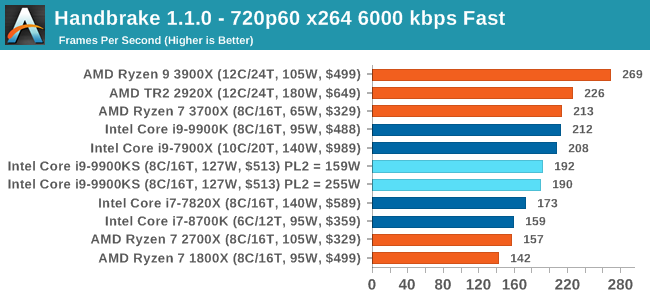
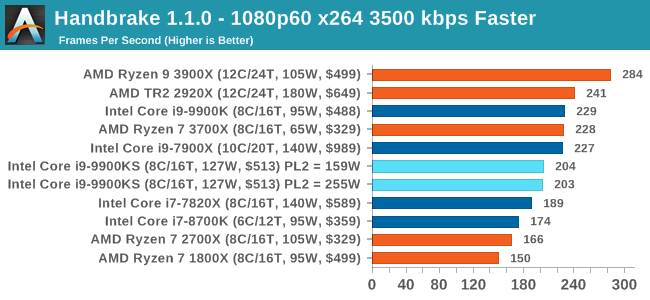
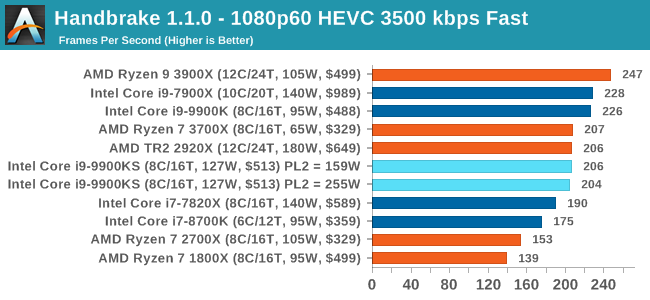
The 9900KS performed worse than our 9900K in our Handbrake tests, and we're not entirely sure why. It might be related to the regression we saw with DigiCortex.
7-zip v1805: Popular Open-Source Encoding Engine
Out of our compression/decompression tool tests, 7-zip is the most requested and comes with a built-in benchmark. For our test suite, we’ve pulled the latest version of the software and we run the benchmark from the command line, reporting the compression, decompression, and a combined score.
It is noted in this benchmark that the latest multi-die processors have very bi-modal performance between compression and decompression, performing well in one and badly in the other. There are also discussions around how the Windows Scheduler is implementing every thread. As we get more results, it will be interesting to see how this plays out.
Please note, if you plan to share out the Compression graph, please include the Decompression one. Otherwise you’re only presenting half a picture.
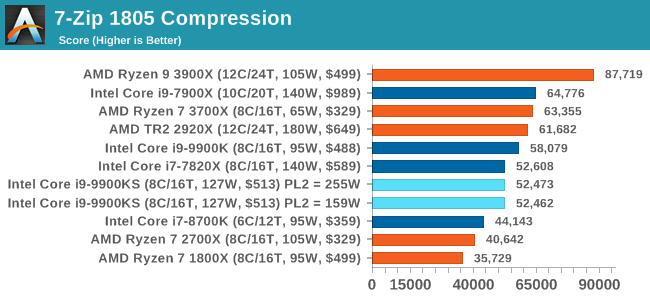
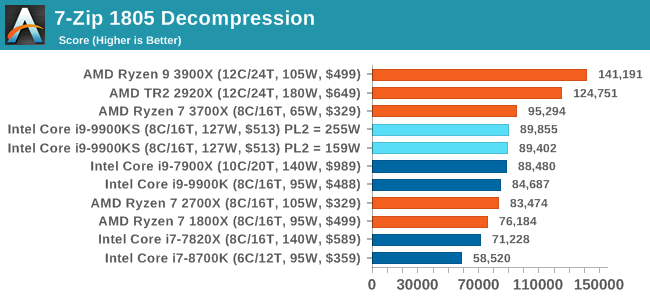
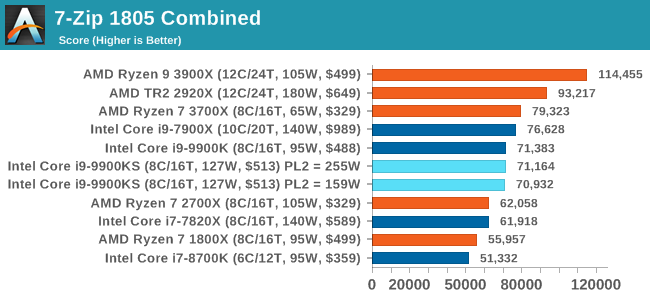
Both the 9900KS settings perform identically here, however the Compression test shows a performance regression compared to the standard 9900K. It does make me wonder if there are additional differences between the two chips (such as an internal clock).
WinRAR 5.60b3: Archiving Tool
My compression tool of choice is often WinRAR, having been one of the first tools a number of my generation used over two decades ago. The interface has not changed much, although the integration with Windows right click commands is always a plus. It has no in-built test, so we run a compression over a set directory containing over thirty 60-second video files and 2000 small web-based files at a normal compression rate.
WinRAR is variable threaded but also susceptible to caching, so in our test we run it 10 times and take the average of the last five, leaving the test purely for raw CPU compute performance.
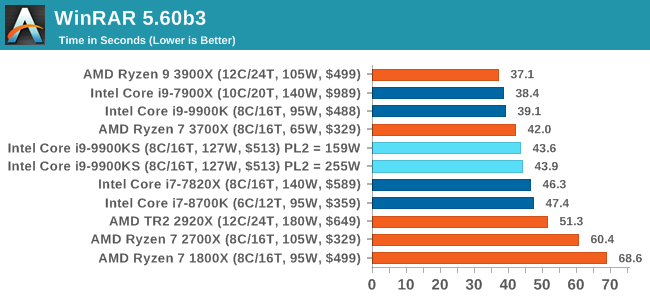
AES Encryption: File Security
A number of platforms, particularly mobile devices, are now offering encryption by default with file systems in order to protect the contents. Windows based devices have these options as well, often applied by BitLocker or third-party software. In our AES encryption test, we used the discontinued TrueCrypt for its built-in benchmark, which tests several encryption algorithms directly in memory.
The data we take for this test is the combined AES encrypt/decrypt performance, measured in gigabytes per second. The software does use AES commands for processors that offer hardware selection, however not AVX-512.
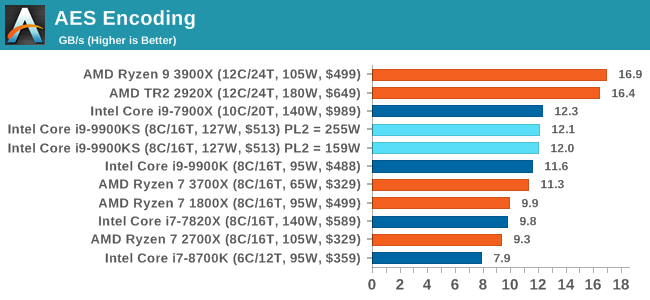










235 Comments
View All Comments
1_rick - Thursday, October 31, 2019 - link
As far as pricing goes, Microcenter lists it as in stock for $599 (might be an in-store only price). Newegg lists it for $569, but they're sold out.Sahrin - Thursday, October 31, 2019 - link
lol, this is supposed to be the chip Intel launches in response to AMD's second-best to get the 'last word' - instead it's a replay of Zen2 launch day all over again with the 9900K's sporty younger brother getting humiliated.ballsystemlord - Thursday, October 31, 2019 - link
Spelling and grammar errors:"...but the system was fully table the entire time."
"stable" not "table".
"...but the system was fully stable the entire time."
"It would appear that there is something else the bottleneck in this test."
Mis-written:
"It would appear that there is some other bottleneck in this test."
ballsystemlord - Thursday, October 31, 2019 - link
"One question that does remain however, is which set of results should we keep?" Keep to Intel guidelines. That's what you do with memory speeds and other things, I'm sure.That is also the guaranteed results for all consumers.
Goloith - Thursday, October 31, 2019 - link
Normally this hardware site is my "go to" for hardware reviews. However, holy mother of Jebus was this test bed terrible. Let's buy a Porshe and throw on old outdated tires on it. This should have been paired with a 2080 to, but you pair it with a 1080?Rule# 1, don't go full retard.
Goloith - Thursday, October 31, 2019 - link
Or with a 2080 tiDeath666Angel - Saturday, November 2, 2019 - link
The thing is, that would invalidate all older results. I'm guessing they will update the GPU in 2020 and retest certain legacy CPUs. What do you think would fundamentally change about the results with a newer GPU, though? I doubt it would be much, since the trends are the same with all the different graphical settings they already test at.ablevemona - Friday, November 1, 2019 - link
"in its hexagonal box"?Nichronos - Friday, November 1, 2019 - link
Why there isn't any Voltage table as all other Anandtech review have? We want to know how much can you undervolt the KS at the stock 5GHz!!!Thunder 57 - Friday, November 1, 2019 - link
Is that Katamari all over your new toys again??